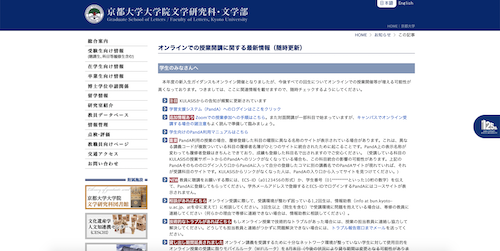TopicsTeacher Interview
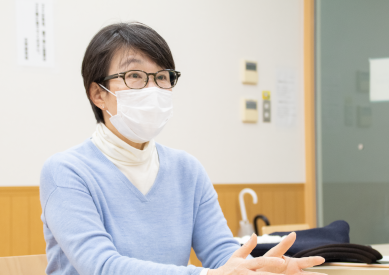
Using an iPad to Conduct a Hybrid Class Easily and Effectively amid the COVID-19 Pandemic
Professor Chigusa Kita (Cultural History of Technology), Graduate School of Letters, Kyoto University
The academic year 2020 was hit particularly hard by the global COVID-19 pandemic, and subsequently, the demand for online classes skyrocketed. Amid the turmoil, Dr. Chigusa Kita took the lead in facilitating the enrichment of online teaching and learning environments for the Graduate School and Faculty of Letters. Before the pandemic, quite a few professors of the school and faculty were teaching without computers. Dr. Kita applied her expertise to promote their online teaching experience by making support services available both online and off-line. In the fall semester of 2020, Dr. Kita proposed a hybrid (HyFlex)* teaching model by integrating iPads into the classroom, which has been appreciated by the entire university thereafter. Today, we ask Dr. Kita to share her stories on what inspired her to promote online classes and what she did to drive the transition forward, as well as her vision of how her successful online experiences should be applied to higher education in the post-COVID-19 era.
*A hybrid class is a general term representing a class format that combines online and face-to-face classes, of which a HyFlex model refers to a class that takes place both face-to-face and online at the same time. For further details, please click here.
- Profile
- After receiving her Doctor of Letters from the Graduate School of Letters, Kyoto University, Dr. Kita started her academic career as Assistant Professor, Academic Center for Computing and Media Studies, Kyoto University; then Associate Professor and Professor, Faculty of Informatics, Kansai University; and currently Professor of the Graduate School of Letters, Kyoto University (from fall 2019). Her field of expertise is the History of Technology, especially from cultural aspects. She has a working experience at NHK as a TV program director after completing her bachelor's degree. As a professor at Kyoto University, she played a leading role in setting up online teaching environments at the Graduate School and Faculty of Letters. Her effort in integrating iPads into hybrid (HyFlex) classrooms has been widely shared among Kyoto University's graduate schools and faculties. She enjoys cooking and yoga to refresh herself.
Going online at the Graduate School and Faculty of Letters during the COVID-19 pandemic
Dr. Kita, I hear that you have been keeping yourself busy with online class support in different ways under the COVID-19 pandemic. Could you walk us through what exactly you have done?

I have engaged mainly in three areas.
What I did at first was to make information and support services available for how to use PandA, the LMS (Learning Management System) of Kyoto University. Then, I set up and managed the "Online Class Support Desk" inside the Graduate School and Faculty of Letters building, which offers technical support for setting up PandA and Zoom, as well as lending equipment necessary for online classes. Additionally, I came up with a systematic classroom practice using iPads and shared my classroom experiences with other faculty members to promote their teaching in a hybrid format from the fall semester of 2020 onward.
What inspired you to make these efforts?
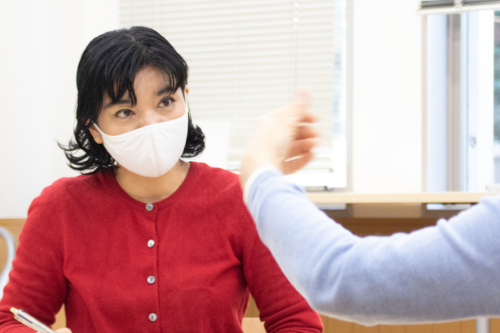
Associate Professor Mana Taguchi interviewing Dr. Kita
It all started back in mid-March. As the COVID-19 pandemic continued to evolve, the Graduate School and Faculty of Letters set up a committee on March 17, 2020, to discuss class policies for the spring semester (hereafter referred to as Class Planning Committee). As a committee member, I joined the faculty members of the executive board, of the academic affairs committee, and other administrative staff to explore feasible options for the new semester.
The committee members agreed that it would be best to keep the current teaching style even though classes went online, so we first examined how to ensure the quality of audio communications in conducting online classes.
In the initial stage of our discussion, we planned to implement a hybrid model for our classes. Given that the number of students in each class at the Faculty of Letters was not very large, we assumed that the hybrid strategy would allow half of the students to be in the physical classroom and the other half to be online.
In the end, however, the entire spring semester went online. It was then that we steered our focus to providing technical support on the use of PandA and setting up a reference webpage for the convenience of both faculties and students. PandA is a versatile platform for online classes in Kyoto University, but a large portion of the faculties and students at the Graduate School and Faculty of Letters was not familiar with PandA, as it was newly introduced to the school and faculty's system in the fall semester of 2019.
Online class support about the use of PandA
It sounds challenging to provide technical support and information to meet the needs of both faculties and students at the same time.
Indeed. To avoid information congestion, we clearly separated information for faculties and information for students, so that everyone can get easy access to the information they need.
For our students' immediate reference, we added a new page to the graduate school and faculty's website as the "latest information on online classes" (shown on the left), which we update as much as possible. The same information is posted to KULASIS immediately by the staff of the undergraduate student section. As the section serves as a liaison for students, we work closely with the section to ensure that students stay informed with the latest class information on KULASIS.
What did you do to assist faculty members then?
We made our services available both online and off-line. With our online services, we created an email help desk to cater to individual questions and needs by e-mail, as well as providing technical support and guidance on a newly launched project site named "Tips for PandA." Our off-line support includes setting up an "Online Class Support Desk" inside the Faculty of Letters building. When faculty members encounter any technical issues with PandA or Zoom, they can visit the support desk and ask for face-to-face tutoring. The support desk has some electronic devices, such as iPads, available for lending to aid online classes.
Could you go a bit deeper into the email help desk? How does it work?
Sure. We created an email address (bun_OnlineSupport [at] bun.kyoto-u.ac.jp)* to answer individual questions from our faculty members. Besides myself, the Information Committee members, an assistant professor of information systems, the staff of the undergraduate student section, and the assistant technical staff of the "Online Class Support Desk" have responded to the questions. What we do mainly is just answering questions and inquiries received to the address, but exceptionally in April and May when access to PandA increased sharply, we sent out messages to all full-time and part-time faculty members to assist with their familiarization with PandA.
** "@" has been changed to [at] to prevent spam.
What is the "Tips for PandA" like?
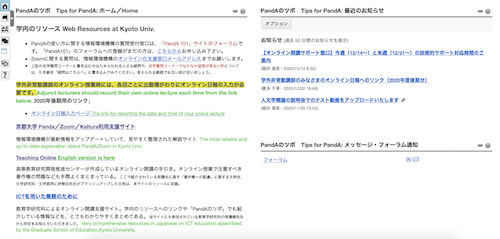
"Tips for PandA" website (a project site on the PandA platform)
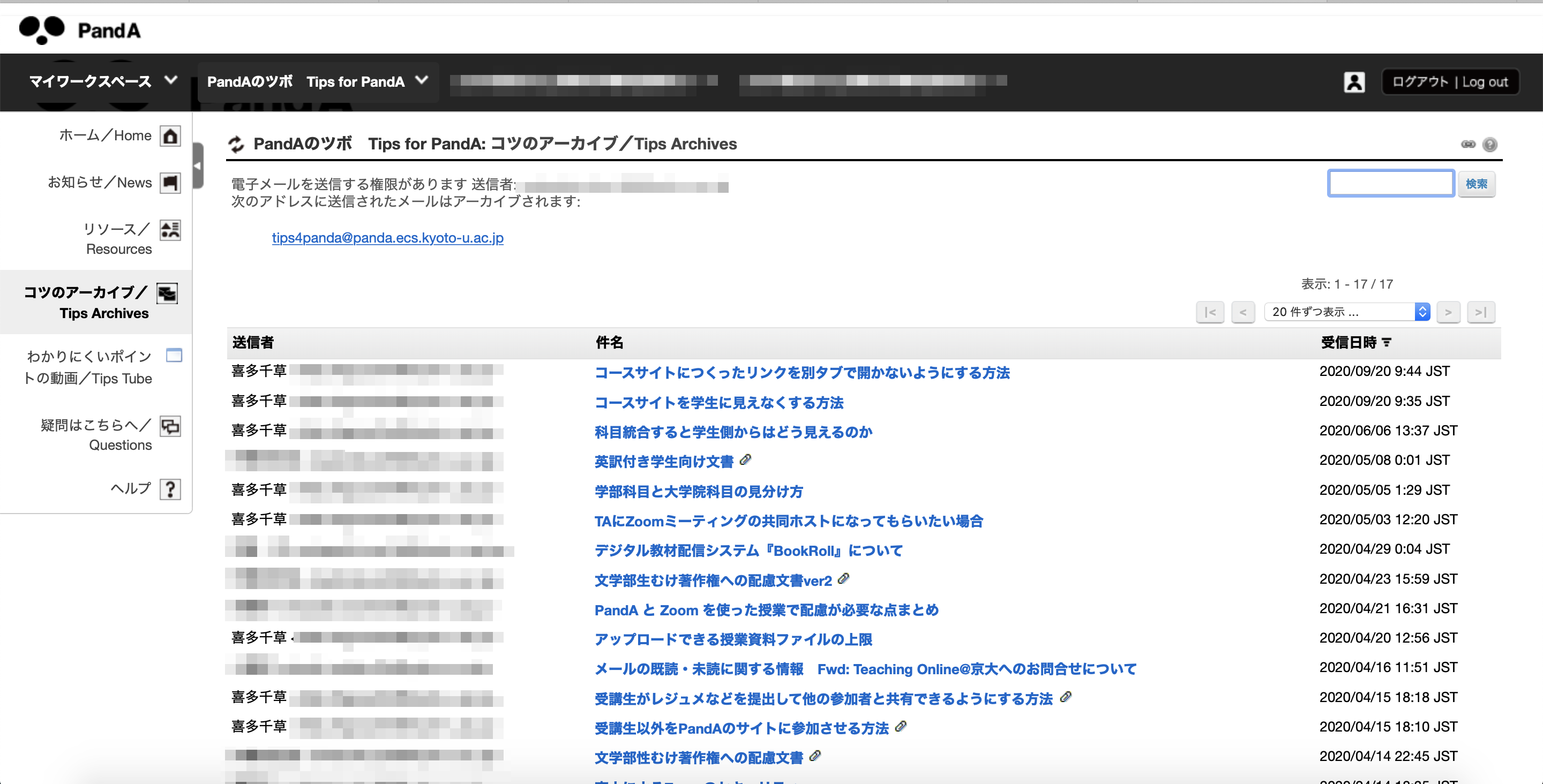
The project site is mainly handled by Dr. Kita, but many other faculties have collaboratively posted tips on online teaching.
It was created on PandA as a project site for the faculty members of the Graduate School and Faculty of Letters. All faculty members who teach online inside and outside of Kyoto University, full-time and part-time teaching faculties, and some assistant technical staff members, participate in this project.
Out of all the functions available on the project site, one of the most popular ones is the "Tips Archives," a compiled list of frequently asked questions received through the aforementioned email help desk, solutions to technical problems, and useful tips.
We also provide video tutorials named "Tips tube" in Japanese and English elaborating on some of the traps that PandA users may encounter, and also grant users access to some downloadable templates as online teaching "resources." Additionally, a forum has been set up to facilitate discussion and idea-sharing about online classes among users.
I was the one who took the lead in setting up the project site. Still, the Information Committee members and some collaborating faculties immediately added new items to the page as soon as it was released, and so it gained momentum. Right now, two assistant technical staff members of the "Online Class Support Desk," which I will talk about later, update the page by following my instructions.
I am really impressed with this site. How come I didn't see this before?
You would have never heard of it because the access to this project site is limited to the faculty members of the Graduate School and Faculty of Letters, basically. It is therefore not visible to people outside of the school and faculty. This is probably the reason why some people criticize that "the visibility of FD activities at the Graduate School and Faculty of Letters is quite low to the outsiders."
Nevertheless, we designed the project site this way solely for the convenience of our faculties. For example, any questions about PandA should be resolved nowhere else but on PandA. We also felt the urge to provide custom-made information and support for the sake of the Graduate School and Faculty of Letters, even though an abundance of useful information on online classes has been provided by various departments, such as the Center for the Promotion of Excellence in Higher Education and the Graduate School of Education.
Having said that, we are happy to share the "Tips for PandA" site with faculties from other departments. If you are interested, please contact the Online Class Support Desk mentioned below.
I can imagine that you went through a very rough year while struggling with online lectures and a flood of questions through e-mail.
That's true. Registration of the part-time lecturers to the PandA platform at the beginning of the spring semester was literally a nightmare. Since the Graduate School and Faculty of Letters have more part-time lectures than other graduate schools and faculties do, the registration process took a much longer time and painstaking effort for us.
For part-time lecturers to access PandA, they need an ECS-ID. However, what took us by surprise was that not all of them had their ECS-ID fully ready or available. Some did not have an account to start with, some had their IDs already expired and not renewed yet, and some had their application pending. Given the situation, applying for new IDs for all part-time lecturers at once was not even an option for us, and so we had no other choice but to handle a variety of cases on an individual basis. To avoid this kind of trouble, it would be great if part-time lecturers are automatically registered in PandA when they start their contract with Kyoto University.
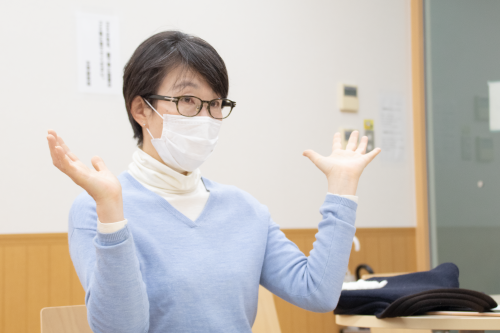
In addition to various types of inquiries from part-time lectures, we were overwhelmed by a surge of e-mail messages from full-time faculties asking how to use PandA and Zoom throughout the spring semester. Since the whole volume of e-mail inquiries was much more than we could handle, we speeded up in our e-mail response time and did not bother showing too much politeness in our texts, in the understanding that email was a spoken medium than a written one.
It seems likely that our faculties have been getting used to teaching online classes lately. And, with the "Tips for PandA" page getting more resourceful, most faculties could look for solutions directly from the page. Accordingly, we receive lesser and lesser e-mail inquiries these days.
Face-to-face class support through the "Online Class Support Desk"
Next, could you explain what the "Online Class Support Desk" does?
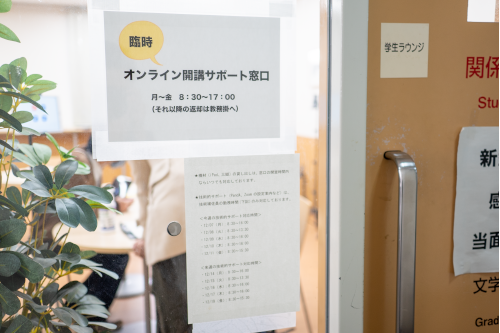
The support desk acts as a window to provide comprehensive support on online classes and lends equipment necessary for teaching online for the full-time and part-time faculties of the Graduate School and Faculty of Letters.
The support desk is located inside the Faculty of Letters' student lounge space, which has been temporarily closed. Two assistant technical staff members were hired to work as support desk staff, and the desk started its operation on April 2 to allow enough time for classes to resume in May. The support desk is open every day except for long holiday periods, and at least one assistant technical staff member is on duty. For the fall semester when the need for hybrid classes was expected to arise, we assigned some assistant technical or administrative staff members, or office assistants, to be working at the desk from 8:30 through 17:00.
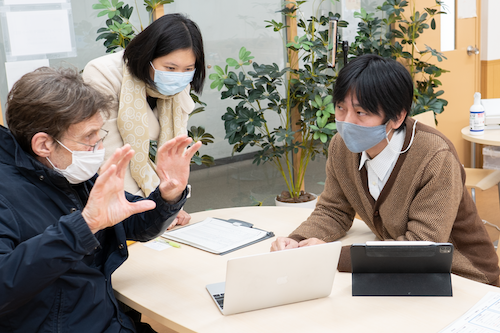
On the interview date, some members of the faculty walked into the support desk to seek advice. Mr. Horii, one of the assistant technical staff members, was on duty then.
On hiring the two assistant technical staff members, we asked them to participate in one of my class sites on PandA as instructors to gain the knowledge and skills necessary to work as support desk staff. After that stage, they started working at the support desk to provide information on how to use PandA, as well as helping us set up the PandA project site.
Once the fall semester kicked in, faculty members started teaching in a hybrid format. From this time onward, the assistant technical staff's main duties shifted to handling questions to facilitate online classes and managing the lending service of iPads and other electronic devices necessary for online classes.
Hybrid classroom practice using iPads
What was it that prompted you to use iPads in hybrid classes?
Observing the way how our faculty members reacted to the rapid shift to an online teaching environment, I realized that some faculties had not used computers in their classes before. In the course of our exploration on how to integrate a hybrid model to our classes in the same fashion as face-to-face classes, one of the assistant teaching staff members suggested an idea that iPads might be easy to use for hybrid classes. Incidentally, right before the spring semester started, the Institute for Information Management and Communication lent us some iPads. With them, we tried out every possible solution we could think of to ease the burden of our faculties in their transition to hybrid teaching. Finally, we settled on the current form.
What do you think are the advantages of using iPads?
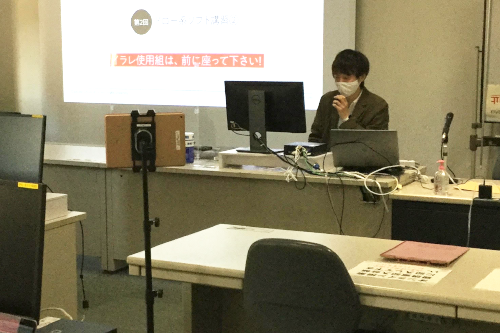
Integrating iPads into a hybrid classroom (photo from Dr. Kita)
The most significant advantage of using iPads in the classroom is its readiness. I mentioned the same thing at the recent internal seminar,* but if you teach in a small-sized classroom, all you have to do is set up an iPad to broadcast audio and video online, and you can start teaching as usual.
For large-sized classrooms, however, it is not easy to maintain good audio quality, so we are appealing for the need of HyFlex teaching environments to become available soon.
*The 9th internal seminar series "My Hybrid/ Online Class @ Kyoto University" held on October 29, 2020. Archived videos and documents from the seminar are available here (access from the university network only): Access with via on-campus network KUINS.
At the Online Class Support Desk, what kind of services do you extend to promote the use of iPads?
We lend iPads, assist users with configuring settings, and provide technical assistance.
In the beginning, the support desk staff took care of setting up iPads, so that faculties could immediately use them in their classes. Things changed a little bit over time, and now full-time faculties are requested to purchase their own iPads if needed. Even those who lend an iPad from the support desk, they come to the support desk just for a pick-up and set it up on their own, as they know how to do so.
Not all classes at the Graduate School and Faculty of Letters incorporate the iPad technology, and some faculties devise their own strategies to teach in a hybrid approach. We advertise our support services and iPad-integrated online class models to all faculty members.
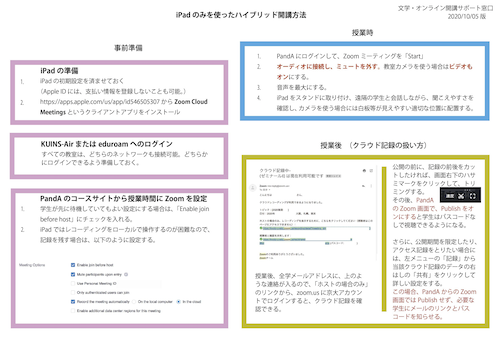
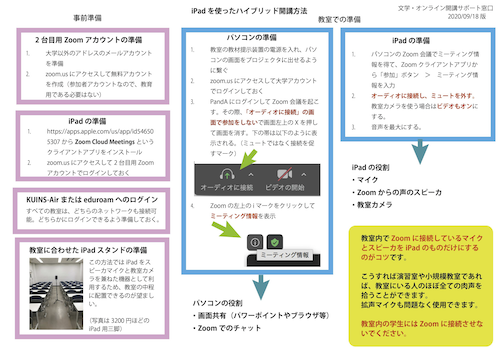
A workflow for implementing iPad-integrated hybrid classes, made by Dr. Kita. Downloadable in PDF format from here.
I am deeply touched as your extensive efforts are truly remarkable.
I'm not the only person who made all these things happening, you know? It is true that I took the first few steps, but it didn't take long until other faculty members and administrative staff joined my effort, and we have been working collaboratively ever since. With the email help desk and the "Tips for PandA," I should give credit to the Information Committee members and collaborating faculties, as well as the two assistant technical staff members at the support desk, for their extensive support and hard work.
I don't think that a top-down approach would ever work well with the culture of our graduate school and faculty. One faculty member commented that the Online Class "Support" Desk was a well-chosen name. Had it been named something like Online "Promotion" Desk, it would have given the impression of a top-down approach.
I see your point. How would you like to maintain this cooperation system from now on?
We are in the middle of a discussion as to the future operation of the Online Class Support Desk at the graduate school and faculty. The operating system will remain the same no matter who takes over the responsibility in the future, though.
I myself will stay involved as much as possible, but only on a voluntary basis to give advice. The two assistant technical staff members are getting used to supporting online classes, and they can update the "Tips for PandA" page for us. My initial plan was to create a system that works autonomously as a framework, and which does not rely heavily on individuals. I'm happy to see that these two assistants are gradually getting independent and do not need much of my supervision.
Creating a systematic framework is something that I have always aimed at when holding a managerial post. I will continue to watch over the structure that we have made this time, to ensure that it functions well from now onward.
Building a user-centered class support system
Could you share the story behind where the idea of using iPads in the classroom came from? Do you think your working experience at NHK has some influence on the idea, more or less?
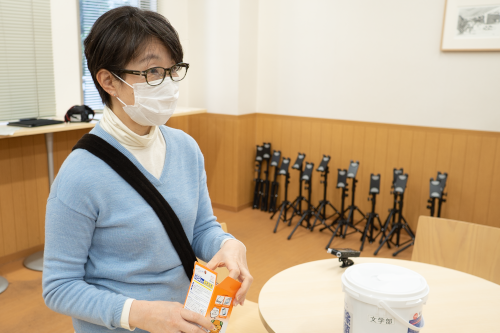
At the support desk, staff members use disposable eyeglass wipes to sanitize iPads and other devices. Having worked for NHK, Dr. Kita is always tempted to check the angle of commercial products when taking photos, so as not to show their trademarks.
My experience at NHK was useful in a way that I could jump into considering a hybrid model at an early stage, rather than creating a "professional quality" on-demand system for our teaching.
When I was at NHK, I was involved in a production process of highly professional educational program materials as a director. Even after I left NHK to study at graduate school, I was engaged in program productions as a freelance director.
What I learned from the experience is that handling high quality on-demand teaching materials is not so easy. It requires well-equipped recording facilities, as well as the setup and technology to edit recorded videos. Pauses and slips of the tongue, which are often overlooked in live broadcasts, can be very unpleasant in recorded videos. We should keep the viewers' attention at all times, but if recorded videos are poorly edited, viewers can easily lose interest and end up not focusing on the videos.
Based on this experience, I soon gave up on the idea of making professional on-demand teaching materials in a higher education setting.
Rather, by observing the teaching trends at the Faculty of Letters, I came to explore the possibility of accommodating a hybrid teaching model.
Lack of the aforementioned recording equipment and technology was not the only problem. We realized that most faculties conducted face-to-face classes without computers before the pandemic. When we discussed what would be the best way to provide online classes while maintaining the quality of their teaching performance, we came to the conclusion that hybrid classes, where live face-to-face classes take place and are made available as online classes, would probably work well.
Our decision doesn't eliminate the possibility of teaching on-demand classes. However, for the reasons mentioned above, I do not think that on-demand classes are suited for all faculties at this point.
Your passion for education speaks for itself, for how much you have devoted yourself to meet various needs for the implementation of online classes.
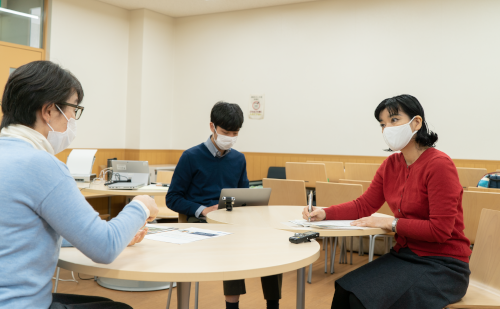
As much as I'm honored, I have to admit that I am not that enthusiastic about education, so I am feeling a bit shy for all the attention I receive for what I have done. It is purely my academic interests as a researcher that drive me to promote online classes, rather than my passion for education.
Academic interests as a researcher?
I am a specialist in the cultural history of technology, and I am particularly interested in studying the impact of modern technologies, like ICT and computing, on society. From that perspective, some questions struck me when the COVID-19 pandemic forced us into an unprecedented situation and presented the need for embracing ICT technologies in educational settings: How would people who had not used such technologies before reacting to the emergency? How would higher education be reshaped by the pandemic?
Let me introduce one very interesting perspective to find answers to these questions: an architect and a professor named William Mitchell proposed a concept of the "economy of presence*" in his book "e-Topia." He discusses the changes in society, especially in the means of communication, driven by the progression of science and technology.
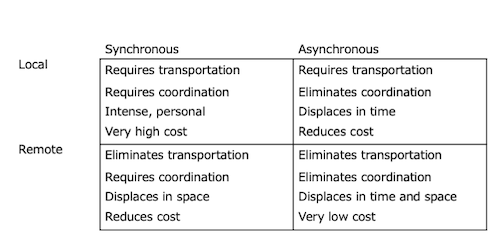
Four quadrants of the "economy of presence"
(Source: Mitchell, William J. 1999. E-Topia: "Urban Life, Jim-but Not as We Know It." Cambridge, MA: MIT Press, p.138)
The book classifies communication forms in two axes and four quadrants: synchronous or asynchronous, and local or remote. It then argues that advances in communication technologies such as the Internet have created a new situation in which the forms of communication are optimized by a trade-off between the benefits of communication density and the temporal and spatial costs of communication.
According to this theory, a combination of synchronous and local communication has the highest density and quality, but it is also the most costly communication because time and space need to be matched. On the other hand, asynchronous or remote communication lowers the density of communication, whereas both reduce the cost of time and space.
This perspective poses a very interesting question on the presence of university classes. Up until now, university classes have been considered as a typical example of high-cost communication. The digital transformation of university education during the COVID-19 pandemic, however, made it apparent that some classes are better held in a face-to-face and synchronous format, whereas some other classes do not necessarily require such a format. The COVID-19 crisis forcibly accelerated the progress of information technology, and as a result, traditional communication forms are now being reconsidered.
As a specialist in the cultural history of technology, I am interested to see what the future holds for universities and for our society after going through the COVID-19 pandemic.
Advantages of online classes and how to make full use of the advantage
Have you seen any advantages in your own online teaching?
Let's see, if I were to give some examples of advantages, students participate in class seriously and respond well, and I also like the flexibility in designing classes.
In what situations do you feel that students respond well to your classes?
In my classes, I get far more questions and comments from my students than I ever did in the past. In a seminar class, I allow about 15 to 20 minutes for my students to post questions on Slack. Graduate students compile them, and I give feedback and add comments to the questions. This way works out very well as many students do not hesitate to ask questions.
Besides, in a lecture class, I sometimes ask questions like "What do you know about xxx?" and invite students to post their answers simultaneously on Mentimeter or show their opinions through Zoom's voting function. In other words, one of the biggest advantages of online classes is that they allow us to interact with students in a way that we have hardly done in a traditional classroom.
Sounds great. Anything else?
I can now design my classes more flexibly.
Online classes give us the flexibility to go beyond the classroom and explore different sites virtually. In my media culture course in the Faculty of Letters in the spring semester 2020, we asked a director of NHK's Kyoto bureau to give us a virtual tour around the bureau. In a university-wide liberal arts and general education course in the fall semester, we had a person from the Asahi Shimbun show us around the editorial office of the newspaper over the camera. These are rare sites that students may not have a chance to see in a regular classroom setting.
Another benefit I can think of is to use recorded classes for FD. In the relay seminar series run by early-career lecturers, which I participate in as a coordinator, we have actually practiced watching recorded videos of other faculty members to learn and discuss how to teach classes effectively.
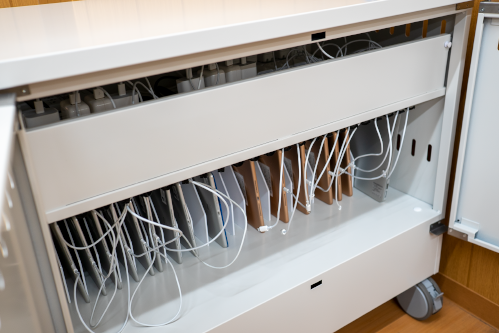
Standby iPads for lending at the "Online Class Support Desk." All the devices in the cabinet are fully charged, configured for Zoom, and ready to be used in class.
Thanks to online classes, the hurdle of inviting external lecturers and guest speakers has been substantially lowered. I feel less pressure to ask for invited lectures because I do not have to worry about all the hassles of their traveling.
In my seminar, I sometimes invite professors of other universities to serve as guest commentators to cater to the various needs of my students from different fields. Apparently, it is now much easier for me to approach guests to join us online. Another positive change I noticed is that, in the relay seminar series, we can ask the lecturer from the previous week to participate in a part of the following class to give us feedback from the previous week, as we no longer have to worry about their traveling time. This is also one of the biggest advantages that improved students' learning experience.
I am excited to see how this new tradition evolves. It may happen for real that we invite a variety of professionals as guest speakers from all over Japan, and even from the world.
This is my last question for today. What is your vision for online classes in the future?
The advent of online classes has made teaching much easier in many ways. I'm hoping to incorporate the lessons learned from this experience into our future classes.
At the same time, how online education evolves from now all depends on the level of convenience for students. On the one hand, it's always reasonable to give students the choice between learning face-to-face and online. On the other hand, they may find it not so convenient if they have a school schedule where some classes are held face-to-face while others are online. At some point, we should narrow down the options either face-to-face or online.
I hope that a new face-to-face class style will emerge by integrating the advantages of online classes while ensuring convenience for students.
Thank you very much for taking the time to speak with us today.
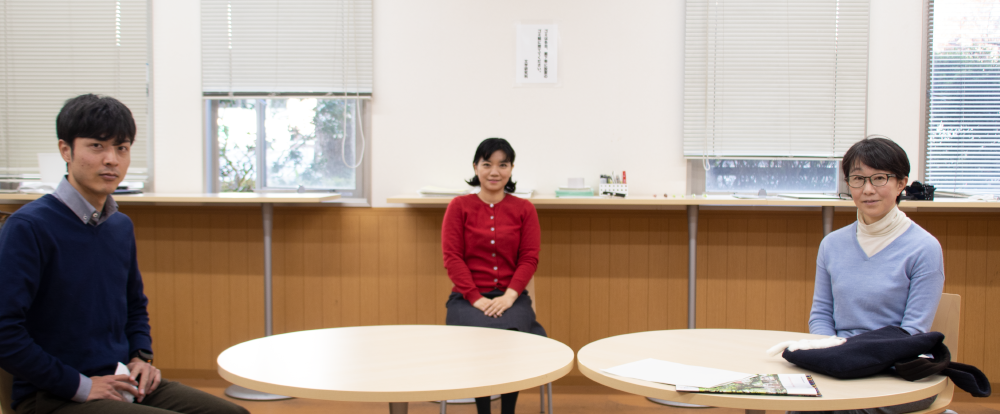
A group photo of today's interview: From the left, Dr. Shun Watanabe and Dr. Mana Taguchi of the Center for the Promotion of Excellence in Higher Education, and Dr. Chigusa Kita of the Graduate School of Letters.
Interviewers:Mana Taguchi and Shun Watanabe
Article composition: Shun Watanabe
Photography: Takeo Suzuki
Date of Interview:December 11, 2020
Published online: February 5, 2021 (Original article)
March 18, 2021 (English article)

